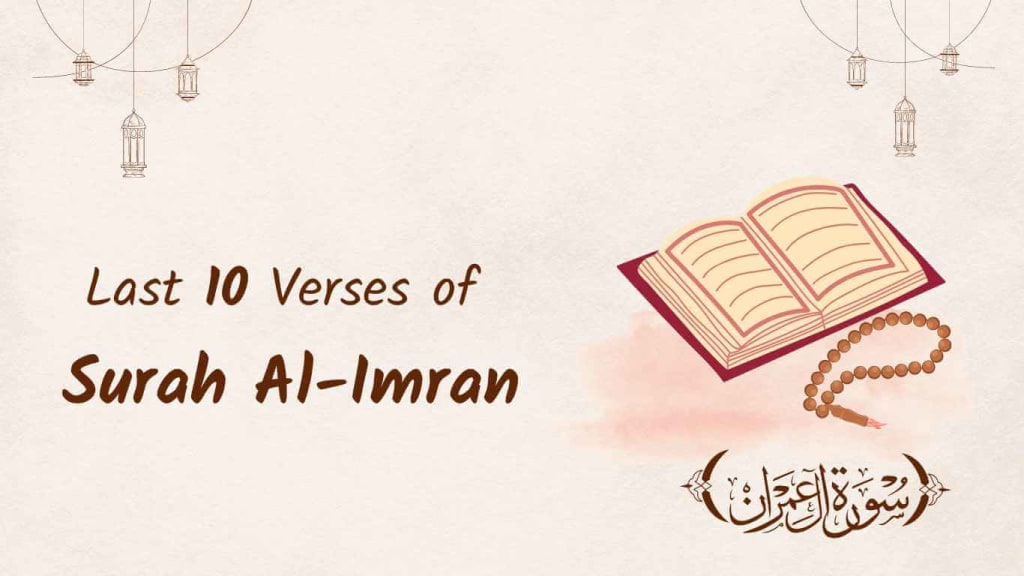The Virtues of the Last 10 Ayat of Surah Al Imran
A Revived Sunnah of the Prophet

Surah Al-Imran, the third chapter of the Holy Quran, is a treasure trove of divine guidance, wisdom, and reflection. The Last 10 Ayat of Surah Al Imran are especially significant for their profound spiritual insights and exhortations for believers. These verses call for contemplation on the creation, continuous remembrance of Allah, supplications for forgiveness, and perseverance in faith. This article explores the virtues of these ayahs, supported by relevant Hadiths that highlight their importance.
Verses 190-191: Contemplation and Reflection
Verses:
"Indeed, in the creation of the heavens and the earth and the alternation of the night and the day are signs for those of understanding. Who remember Allah while standing or sitting or [lying] on their sides and give thought to the creation of the heavens and the earth, [saying], 'Our Lord, You did not create this aimlessly; exalted are You [above such a thing]; then protect us from the punishment of the Fire.'"
Virtue:
These verses encourage believers to reflect on the natural world as a testament to Allah's existence and omnipotence. Contemplation of the cosmos leads to a deeper appreciation of divine wisdom and the purpose of life.
Hadith:
Prophet Muhammad (PBUH) said, "Woe to the one who reads it and does not contemplate." (Sahih Muslim). This hadith emphasizes the importance of pondering over these signs in nature to truly grasp the greatness of Allah.
Verses 192-193: Seeking Protection from Hellfire
Verses:
"Our Lord, indeed whoever You admit to the Fire - You have disgraced him, and for the wrongdoers there are no helpers. Our Lord, indeed we have heard a caller calling to faith, [saying], 'Believe in your Lord,' and we have believed. Our Lord, so forgive us our sins and remove from us our misdeeds and cause us to die with the righteous."
Virtue:
These ayahs highlight the believers' plea for protection from hellfire and forgiveness of sins, acknowledging their vulnerability and dependence on Allah's mercy.
Hadith:
Aisha (RA) reported that the Prophet (PBUH) used to recite these verses frequently in his night prayers (Tahajjud). (Sahih Bukhari). This practice demonstrates the significance of these supplications in seeking divine mercy and forgiveness.
Verses 194-195: Prayers for Forgiveness and Righteousness
Verses:
"Our Lord, grant us what You promised us through Your messengers and do not disgrace us on the Day of Resurrection. Indeed, You do not fail in [Your] promise. And their Lord responded to them, 'Never will I allow to be lost the work of [any] worker among you, whether male or female; you are of one another.'"
Virtue:
These verses embody the believers' hope and trust in Allah’s promises. They emphasize that righteous deeds, regardless of gender, are never in vain.
Hadith:
The Prophet (PBUH) said, "If any Muslim performs his ablution well, then stands and prays two rak'ahs setting about them with his heart as well as his face, Paradise would be guaranteed to him." (Sahih Muslim). The promise of reward for sincere deeds, echoed in these ayahs, is a source of immense motivation for believers.
Verses 196-198: Reflection on the Fate of Disbelievers
Verses:
"Be not deceived by the [uninhibited] movement of the disbelievers throughout the land. A brief enjoyment; then their [final] refuge is Hell, and wretched is the resting place. But those who feared their Lord will have gardens beneath which rivers flow, abiding eternally therein as accommodation from Allah. And that which is with Allah is best for the righteous."
Virtue:
These verses remind believers of the temporary nature of worldly success and the eternal nature of the hereafter. They serve as a warning against being misled by the apparent prosperity of disbelievers and reinforce the promise of paradise for the righteous.
Hadith:
The Prophet (PBUH) said, "The world is a prison for the believer and a paradise for the disbeliever." (Sahih Muslim). This hadith echoes the sentiments of these verses, emphasizing the transient pleasures of the world compared to the eternal rewards of the hereafter.
Verses 199-200: Steadfastness and Patience
Verses:
"And indeed, among the People of the Scripture are those who believe in Allah and what was revealed to you and what was revealed to them, being humbly submissive to Allah. They do not exchange the verses of Allah for a small price. Those will have their reward with their Lord. Indeed, Allah is swift in account. O you who have believed, persevere and endure and remain stationed and fear Allah that you may be successful."
Virtue:
The final verses call for patience, perseverance, and steadfastness in faith. They acknowledge the sincere believers among the People of the Scripture and encourage Muslims to remain firm in their devotion to Allah.
Hadith:
The Prophet (PBUH) said, "Patience is light." (Sahih Muslim). Patience is a crucial virtue for believers, and these verses underscore its importance in achieving success in both this life and the hereafter.
Conclusion
The last ten ayahs of Surah Al-Imran encapsulate essential themes of Islamic faith: reflection on creation, remembrance of Allah, seeking forgiveness, and steadfastness in adversity. They remind believers of the transient nature of worldly life and the eternal rewards of the hereafter. The Prophet Muhammad’s (PBUH) frequent recitation of these verses, as evidenced by numerous hadiths, underscores their profound significance.
By incorporating the recitation and contemplation of these ayahs into daily practice, Muslims can deepen their spiritual understanding, strengthen their faith, and draw closer to Allah. These verses serve as a source of comfort, guidance, and inspiration, reaffirming the timeless and universal message of the Quran.
About the Creator
Enjoyed the story? Support the Creator.
Subscribe for free to receive all their stories in your feed. You could also pledge your support or give them a one-off tip, letting them know you appreciate their work.






Comments
There are no comments for this story
Be the first to respond and start the conversation.